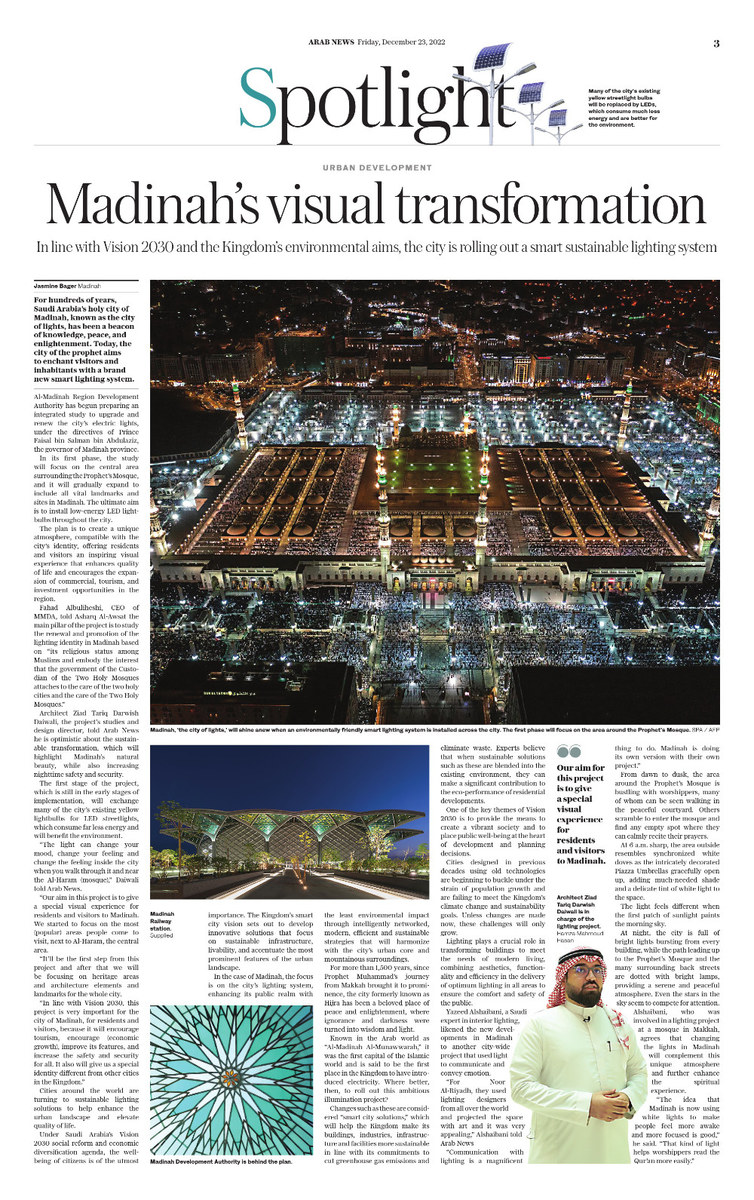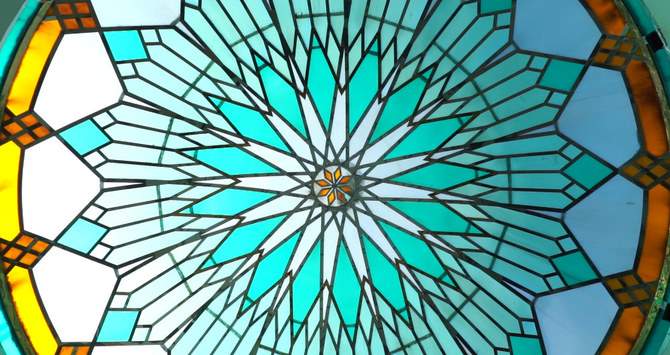MADINAH: For hundreds of years, Saudi Arabia’s holy city of Madinah, known as the city of lights, has been a beacon of knowledge, peace, and enlightenment. Today, the city of the prophet aims to enchant visitors and inhabitants with a brand new smart lighting system.
Architect Ziad Tariq Darwish Daiwali, the project’s studies and design director, told Arab News he is optimistic about the sustainable transformation, which will highlight Madinah’s natural beauty, while also increasing nighttime safety and security.
The first stage of the project, which is still in the early stages of implementation, will exchange many of the city’s existing yellow lightbulbs for LED streetlights, which consume far less energy and will benefit the environment.
“The light can change your mood, change your feeling and change the feeling inside the city when you walk through it and near the Al-Haram (mosque),” Daiwali told Arab News.
“Our aim in this project is to give a special visual experience for residents and visitors to Madinah. We started to focus on the most (popular) areas people come to visit, next to Al-Haram, the central area.

Exterior shot of AlMadinah Region Development Authority’s building in AlMadinah. (Hamza Mahmoud Hasan)
“It’ll be the first step from this project and after that we will be focusing on heritage areas and architecture elements and landmarks for the whole city.
“In line with Vision 2030, this project is very important for the city of Madinah, for residents and visitors, because it will encourage tourism, encourage (economic growth), improve its features, and increase the safety and security for all. It also will give us a special identity different from other cities in the Kingdom.”
Cities around the world are turning to sustainable lighting solutions to help enhance the urban landscape and elevate quality of life. Under Saudi Arabia’s Vision 2030 social reform and economic diversification agenda, the well-being of citizens is of the utmost importance.
The Kingdom’s smart city vision sets out to develop innovative solutions that focus on sustainable infrastructure, livability, and accentuate the most prominent features of the urban landscape.
In keeping with this vision, Al-Madinah Region Development Authority has begun preparing an integrated study to upgrade and renew the city’s electric lights, under the directives of Prince Faisal bin Salman bin Abdulaziz, the governor of Madinah province, according to Asharq Al-Awsat daily.
In its first phase, the study will focus on the central area surrounding the Prophet’s Mosque, and it will gradually expand to include all vital landmarks and sites in Madinah. The ultimate aim is to install low-energy LED lightbulbs throughout the city.

Architect Ziad Tariq Darwish Daiwali, who is in charge of this project, speaks to Arab News from the AlMadinah Region Development building in AlMadinah. (Hamza Mahmoud Hasan)
The plan is to create a unique atmosphere, compatible with the city’s identity, offering residents and visitors an inspiring visual experience that enhances quality of life and encourages the expansion of commercial, tourism, and investment opportunities in the region.
Fahad Albuliheshi, CEO of MMDA, told Asharq Al-Awsat the main pillar of the project is to study the renewal and promotion of the lighting identity in Madinah based on “its religious status among Muslims and embody the interest that the government of the Custodian of the Two Holy Mosques attaches to the care of the two holy cities and the care of the Two Holy Mosques.”
In the case of Madinah, the focus is on the city’s light system, enhancing its public realm with the least environmental impact through intelligently networked, modern, efficient, and sustainable strategies that will harmonize with the city’s urban core and mountainous surroundings.
For more than 1,500 years, since Prophet Muhammad’s journey from Makkah brought it to prominence, the city formerly known as Hijra has been a beloved place of peace and enlightenment, where ignorance and darkness were turned into wisdom and light.
Known in the Arab world as “Al-Madinah Al-Munawwarah,” it was the first capital of the Islamic world and is said to be the first place in the Kingdom to have introduced electricity. Where better, then, to roll out this ambitious illumination project?
Changes such as these are considered “smart city solutions,” which will help the Kingdom make its buildings, industries, infrastructure and facilities more sustainable in line with its commitments to cut greenhouse gas emissions and eliminate waste.
Experts believe that when sustainable solutions such as these are blended into the existing environment, they can make a significant contribution to the eco-performance of residential developments.
One of the key themes of Vision 2030 is to provide the means to create a vibrant society and to place public well-being at the heart of development and planning decisions.
Cities designed in previous decades using old technologies are beginning to buckle under the strain of population growth and are failing to meet the Kingdom’s climate change and sustainability goals. Unless changes are made now, these challenges will only grow.

Interior shot taken at the AlMadinah Region Development Authority. (Hamza Mahmoud Hasan)
Lighting plays a crucial role in transforming buildings to meet the needs of modern living, combining aesthetics, functionality, and efficiency in the delivery of optimum lighting in all areas to ensure the comfort and safety of the public.
Yazeed Alshaibani, a Saudi expert in interior lighting, likened the new developments in Madinah to another city-wide project that used light to communicate and convey emotion.
“For Noor Al-Riyadh, they used lighting designers from all over the world and projected the space with art and it was very appealing. Communication with lighting is a magnificent thing to do. Madinah is doing its own version with their own project,” Alshaibani told Arab News.
From dawn to dusk, the area around the Prophet’s Mosque is bustling with worshippers, many of whom can be seen walking in the peaceful courtyard. Others scramble to enter the mosque to find any empty spot where they can calmly recite their prayers.
At 6 a.m. sharp, the area outside resembles synchronized white doves as the intricately decorated Piazza Umbrellas gracefully open up, adding much-needed shade and a delicate tint of white light to the space. The light feels different when the first patch of sunlight paints the morning sky.
At night, the city is full of bright lights bursting from every building, while the path leading up to the Prophet’s Mosque and the many surrounding back streets are dotted with bright lamps, providing a serene and peaceful atmosphere. Even the stars in the sky seem to compete for attention.
Alshaibani, who was involved in a lighting project at a mosque in Makkah, agrees that changing the lights in Madinah will complement this unique atmosphere and further enhance the spiritual experience.
“The idea that Madinah is now using white lights to make people feel more awake and more focused is good,” Alshaibani said. “That kind of light helps worshippers read the Qur’an more easily.”

















